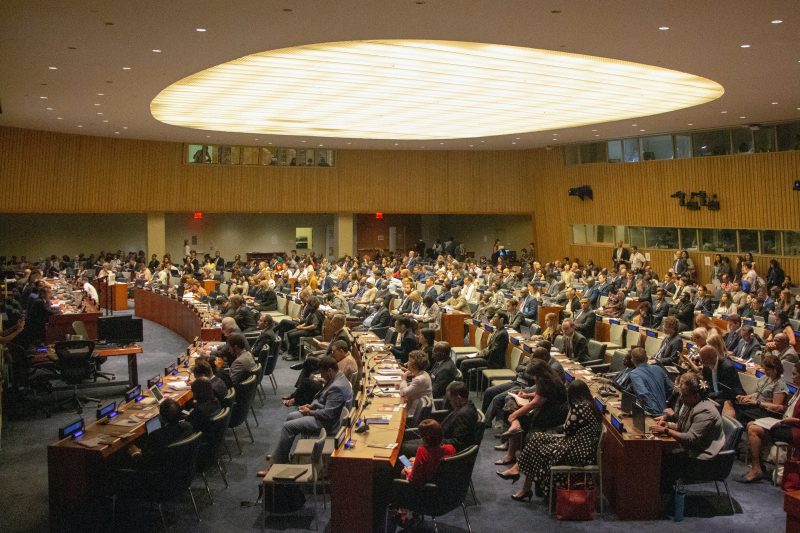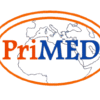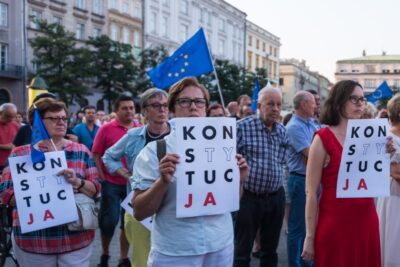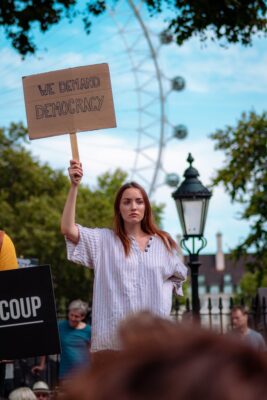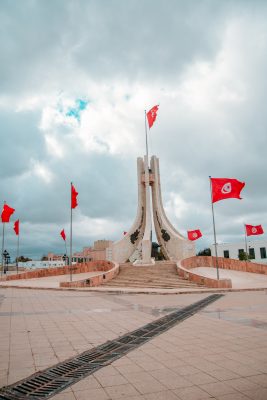Achieving the SDGs has become a far-fetched dream for millions of Arab citizens amid the unfolding COVID19 crisis and the protracted conflicts in many countries of the region.
Six years after the adoption of the 17 Sustainable Development Goals, the Arab region is home to some of the worst humanitarian crises worldwide. War has destroyed countries and communities, turned millions into refugees, and displaced many more. Unemployment in the region is the highest in the world, including the highest rates of unemployment globally for women and young people. Women and girls continue to be marginalized across social, political and economic arenas.
According to the 2020 Arab Sustainable Development Report, the region has one of the highest rates of water scarcity globally, impacting food security and rural livelihoods and increasing urbanization. The impact of climate change and environmental deterioration is also being disproportionately borne by Arab countries. Civic space is shrinking, arbitrary detention is still rampant in many countries, human rights are routinely violated, and corruption levels are relatively high. Arab economies are stagnating, and poverty and inequality are on the rise. In sum, the 2020 Arab Sustainable Development Report have shown that the Arab region is not on track to achieve the SDGs by 2030.
COVID-19 has magnified many of these underlying challenges with impacts that are likely to be deep and long-lasting. Conflicts and social unrest have unfortunately reversed progress on Arab human development that had been achieved over the past few decades and have been limiting the possibility of controlling the pandemic and increased instead the risk of its spread. Countries that are not in conflict are not immune to its consequences as transboundary and spill-over effects of the few conflicts have been felt in all Arab countries. Weak public institutions are also depriving the region from reaching its potential, impeding the capacity of many countries to plan for and mitigate major crises, like the unprecedented #COVID19.
COVID-19 revealed that the undiversified nature of most Arab economies is an impediment to their growth and prosperity since oil, remittances and tourism have been negatively impacted by the pandemic. Arab least developed countries (LDCs) and highly indebted countries had been and continue to be severely constrained to deal with such a crisis and with its long-term consequences. The pandemic has also had the most adverse impact on workers in the informal sector, including women, migrant workers and refugees or IDP workers.
According to a policy brief by the UN Secretary-General on “COVID19 and the Arab States”, the impact of the pandemic along with the socio-economic and political crises that were prevalent in the region have reversed gains previously achieved by Arab countries towards the 2030 Agenda. The most vulnerable, including women, older persons, persons with disabilities, refugees and migrants,
have suffered the most and have borne the burden of this crisis on so many levels, and those left behind are being left even further behind.
Currently, there are mounting concerns expressed by the SG that the COVID19 crisis and the global recession the world is facing as a result of the pandemic could wipe out decades of development and put the 2030 Agenda for Sustainable Development completely out of reach.
However, the region cannot afford a diversion from sustainable development. On the contrary, this is the perfect chance to transform these difficult times into a unique opportunity to ‘Build Back Better’. And for this to happen we must rethink the way we work, the way we do things and try to create new integrated approaches that would ensure a radical change in people’s lives, and not solely focus on recovery and immediate response.
The Humanitarian, Development and Peace nexus must therefore be at the center of everything we tackle and do. We must create social safety nets that protect the poor, we must strengthen investments in social protection and help create the fiscal space we need to invest simultaneously in social protection and revive our economies.
Of course, Lebanon was not immune to the tormenting effects of the COVID19 as it was already reeling under one of its worst financial and economic crises of its modern history. Regrettably, Lebanon is now being identified as a fragile state in a very fragile context.
In fact, while countries are busy responding to the COVID-19 pandemic, Lebanon finds itself grappling with additional serious and interdependent crises, including the economic and financial meltdown, the disastrous impact of the Beirut port explosions, the spill over effects of the Syrian crisis, widespread civil unrest and a political deadlock that is blocking any possible way to recovery. Unfortunately, Lebanon’s stability is shaken to the core, tensions are mounting across the country, security incidents are multiplying, and political polarization is blocking progress on key reforms.
On the deplorable situation in Lebanon that was -not long time ago- considered as a high-middle- income country: The economic crisis has manifested itself in a massive depreciation of the Lebanese currency, resulting in soaring prices of commodities and the closure of many businesses, which adversely impacted people’s purchasing power, their salary value and increased unemployment. According to the UN Economic and Social Commission for Western Asia (ESCWA), more than 55% of the country’s population is now trapped in poverty and struggling to meet their basic needs. Alarmingly, extreme poverty registered a threefold increase from 2019 to 2020, rising from 8% to 23% while the GDP is estimated to have fallen by 13.8% in 2020. These are mind-numbing figures!
The country is currently characterized by almost daily protests fueled by the cumulating socio- economic hardships and continues to be governed by a caretaker government with political leaders unable to agree on the formation of a new government… unable to get a grip on a deteriorating situation. The accountability and responsibility of decision makers towards the catastrophic Beirut explosions also seem to be entering a bleak tunnel of impasse. The Lebanese people feel hopeless, uncertain and insecure!
The COVID19 pandemic and the mounting financial, economic and political crises have posed many daunting challenges in Lebanon and the entire region. However, it offers some favorable opportunities. The pandemic itself has already shown that rapid change is possible, as millions of people adopt new ways of working, learning and socializing. So, opportunities are available, if we only enable them.
There are three imperatives: (1) enhancing women’s leadership as foundational to peace and security (Women, Peace and Security); (2) ensuring Climate Security and (3) monitoring tensions and preventing conflicts.
Research has proven that when women are included in peace processes, there is a 20% increase in the probability of an agreement lasting at least two years and a 35% increase in the probability of an agreement lasting at least 15 years. Meanwhile, when peace processes failed to include women, the peace agreement would crumble within five years.
Recognizing the importance of women’s engagement in peace and security, the UN Security Council unanimously adopted on 31 October 2000 the landmark resolution 1325 on Women, Peace and Security. This resolution, with its four pillars of prevention, participation, protection and peacebuilding and recovery, has galvanized worldwide efforts as the key instrument to engage women in peace and security deliberations.
Lebanon’s first National Action Plan (NAP) on Women, Peace and Security (2019-2022) was adopted in September 2019 and its implementation is underway. One of its strategic priorities is to increase women’s participation in decision-making at all levels, including in the security and defense sectors.
However, women’s participation in these areas are falling particularly behind in comparison to other countries, which was also evident in the 2020 Global Gender Gap report where Lebanon ranked 145 out of a total of 153 countries. Undoubtedly, the current multi-faceted crisis facing the country is challenging the efforts aimed at strengthening women’s participation, notably in the security and economic sectors. For instance, the public sector is currently experiencing a recruitment freeze, which is also impacting efforts to recruit more women in the security sector.
Women’s labor market participation in Lebanon is already amongst the lowest rates in the world, with only 29% for women compared to 76% for men. In June 2020, UN Women estimated that women’s employment in Lebanon was set to fall by 14-19% as a result of the economic contraction rates. These numbers have further worsened in the aftermath of the horrendous Beirut port explosions that hit the country on August 4, 2020. Furthermore, the stringent lockdown measures and school closures that have been put in place to contain COVID-19 spread have amplified women’s unequal burden of unpaid care work and pushed them further to unemployment.
The economic meltdown coupled with restricted movement and social isolation measures imposed by COVID19 have also increased exponentially gender-based violence. As the economic and social stress deepened, women were forced to ‘lockdown’ at home with their abusers at a time when services to support victims have been partially disrupted. The ISF hotline on domestic violence (1754) and other hotlines run by specialized NGOs during the COVID-19 lockdown, reported numerous incidences of violence, including online discrimination, cyber-bullying, cyber-stalking, blackmail, and hate speech. Refugees, migrant domestic workers, LGBTQI individuals, victims of trafficking for sexual exploitation, women and girls with physical and intellectual disabilities as well as the elderly people were at greater risk of abuse and violence during COVID-19.
On the political front, Lebanese women are rarely included in decision-making process aimed at reconciliation, peace-building or post-conflict reconstruction.
Throughout history and more recently during the protests, women have proven their abilities to de- escalate tensions in Lebanon. The importance of their engagement in peace and security deliberations has been well recognized by national and international actors. In fact, globally, it is often women who are brokering peace in situations of conflict, at the community levels. And the UN’s partnerships with women leaders and their networks have proven critical to build trust and help prevent and resolve conflicts in different instances. This can be easily replicated in Lebanon where Lebanese women are remarkably educated and actively engaged in civic work.
All the more, we have seen remarkable work and success of women in containing the pandemic while supporting people’s livelihoods. This confirms an obvious truth that governments and societies work better when they include women, rather than sidelining them. Lebanon’s multi-layered crisis can be used as key entry points to reshape the country in a way where development, sustainable development and peace are interconnected and leveraged to promote human rights and gender equality.
As for the Climate Security issue, it is gaining great prominence amid environmental and ecological degradation, climate change and increasing conflicts.
According to the 2020 Arab Sustainable Development Report, climate change impact is acute in the Arab region. The region is already experiencing significant rainfall decline, higher temperatures and extreme weather events such as storms, floods, droughts and extensive transboundary fires and dust storms. These environmental calamities have caused water scarcity and droughts, substantial economic damages and even loss of life. The World Bank has even declared the MENA region to be one of the most vulnerable places on earth to rising sea levels.
Historically, the MENA region is also highly exposed to regional and domestic tensions, with several transborder conflicts and internal political crises in play. By affecting economies, societies and access to declining natural resources, it is projected that climate change will function as an amplifier of ongoing regional and local conflicts in the years to come.
In the case of Lebanon, it is anticipated that climate change will result in less water availability, increased drought periods, less agricultural productivity and higher energy demand as a result of higher temperatures. It is also expected to cause rising sea levels as well as increased mortality and morbidity.
These added pressures to the existing socio-economic and political hardships, as well as the relative incapacity to mitigate their effects and manage them properly, may escalate inter-community tensions in Lebanon on the one hand and negatively affect its relations with its neighboring countries, namely Syria and Israel, in ways that we do not yet fully understand.
Projecting patterns of climate change into internal and regional geopolitical maps is an increasingly important early-warning tool for the UN to reduce vulnerabilities. It underpins the argument for early climate adaptation strategies to be urgently implemented by Lebanese authorities. In fact, the UN in Lebanon has recently initiated internal discussions on Climate Security, with a view to integrate this concept and its underlying mechanisms in its framework and its upcoming Sustainable Development Cooperation Framework.
Moving now to tension monitoring and conflict prevention, a topic that is particularly relevant to Lebanon, both in terms of challenges and opportunities.
The UN has been systematically monitoring patterns of social tensions in Lebanon for several years now, to better understand the context in which we are working and properly target our peacebuilding, conflict prevention and development programs.
In recent months, tensions have frequently spilled over into the streets of Lebanon’s cities. Some of these have resulted in violence, injuries and deaths, and have aroused strong feelings of uncertainty and fear among the people. Unfortunately, we expect this to worsen.
The increasing political, security and economic pressures have been combining into a combustible mixture, allowing tensions to mount within and between communities, sometimes erupting into random violence. Inter-communal and anti-refugee hate speech are likewise on the rise, and the UN is closely monitoring this.
Over the past two years, we have seen a considerable increase in social tensions between refugees and host communities over low-wage jobs competition but also between Lebanese communities themselves, as all are competing for scarce opportunities amid increased perceptions among the Lebanese of aid bias that favor refugees over the increasingly vulnerable Lebanese.
In our surveys, field visits and study tours, refugees and host communities alike are raising concerns over how the socio-economic situation is leading to loss of livelihood opportunities and to the inability to access basic rights and services.
All the more, the holdback of the Independent Municipal Funds is increasingly resulting in municipalities delaying basic service provision and core staff salary payment. This has resulted in
(1) increased taxes on Lebanese and Syrians alike; (2) inadequate service delivery and the (3) termination of Municipal Police contracts that served well the security of communities in the past. We see this as a major risk of further deterioration of the rule of law.
Concurrently, one of the main drivers of tensions in local communities is related to increased pressure on Lebanese infrastructure, public health and other depleted basic services, at a time when more Lebanese are seeking them due to their deteriorating humanitarian situation. This has prompted UN to support the Government in developing an inclusive social protection system that is easily accessible to all populations in need, in accordance with international human rights standards and in line with our core promise to “Leave No One Behind”.
All these interdependent political, security and socio-economic challenges facing lebanon present a good raison-d’être for a new way of working that is modeled by a transformative trajectory of recovery and development and guided by the triple “Humanitarian-Development-Peace” nexus approach. In fact, the COVID-19 crisis and the multi-faceted hardships facing Lebanon may compound broader challenges of conflict, poverty and stability, and undermine previous development efforts. A fact that we are currently witnessing!
But the UN in Lebanon is stepping up its work and drumming up support to the Government of Lebanon for the benefit of its people and the guarantee of their legitimate rights and putting the people at the center, particularly the most vulnerable and marginalized. The response frameworks address humanitarian needs, socio-economic development and recovery and aim to achieve long- lasting peace and security. They serve as great tools for the implementation of the HDP nexus.
To operationalize the Humanitarian-Development-Peace Nexus, reduce risk, vulnerability and overall levels of need, the UN in Lebanon rolled-out with the WB and the EU in January the implementation of the Lebanon Reform, Recovery and Reconstruction Framework-the 3RF.
The 3RF sets out a ‘people-centered’ response plan, that is fundamentally for the people and about the people. It’s about meeting their critical needs, restoring their livelihoods, safeguarding their basic rights and giving them a voice and a place in policy making… It’s about supporting a further equitable distribution of the growth dividend, addressing the aspirations of youth, and integrating additional women into the labor market and in political life. But it is also, and equally important, about tackling the related governance, recovery and reconstruction challenges.
The 3RF proposes a new way of working, with an HDP nexus approach at its core and building on an inclusive partnership with civil society, the government, the private sector and international partners, acting altogether as full and equal partners in the 3RF implementation process. An independent Oversight Body is being established, giving civil society a powerful voice and a substantial oversight and accountability role in Lebanon’s recovery, which reinforces local ownership while taking into account humanitarian principles and conflict sensitivity, to ‘do no harm’ and ‘leave no one behind’.
Although the Sustainable Development Goals have been gaining traction around the world, reflecting their universal nature and taking root in national policies and strategies, we are still not on track, and the urgency of achieving the goals requires more innovative efforts to pick up the pace.
The Women, Peace and Security Agenda combined with the SDGs can reinforce each other and generate promising results in the coming 9 years, before we reach the global 2030 deadline. One may ask me why are these interdependent and feed into each other… Simply, because the 2030 Agenda has at its core a strong feminist vision of peace and development, and tackles education, economic participation, and environmental integrity for sustainable development. It also commits member states to take action within and across borders to make peace and sustainable development work for women and girls in conflict.
This reminds us of the need to create unstoppable momentum for the Global Goals, and the recipe is clear… We are here to explore and set the course for a speedy implementation of Agenda 2030 in a complex setting such as Lebanon. Five crucial areas require urgent action and innovation:
Firstly, pursuing the implementation of the SDGs are now more important and more relevant than ever before. These goals constitute the best multi-dimensional framework for recovery. In doing so, the momentum created by the COVID19 pandemic may lead to a transformation from what is currently regarded as a global threat, to a global opportunity that provides a new impulse for the realization of Agenda 2030 with a specific focus on equity and building back better.
We certainly need to make a significant leap t o succeed on the SDGs and reduce the suffering of the people. But we need to identify opportunities and new innovative ways to achieve tipping points to change the trajectory on each of the Global Goals. This is by no means an easy task. But together we can make this challenging task possible. And the role of the University as part of the academic and education community is crucial here in proposing new and sustainable approaches, solutions and technologies to meet the multi-faceted challenges of sustainable development.
Secondly, for countries in chronic emergencies, fragile contexts and recurring crises, we should work simultaneously on different fronts. These include tackling the root causes of fragility by prioritizing the principles of prevention, equality and leaving no one behind… Strengthening coordination and multi-stakeholder partnerships, including with the government, civil society, the private sector, academia, International Financial Institutions and donor partners… Prioritizing the development of national systems and capacities that would help the delivery of SDGs strategies at the national level… and investing in local communities.
In Lebanon, this means an overarching response with three central goals:
First, a people-centered recovery that restores people’s livelihoods, achieves social justice for all -including women, the poor, and other vulnerable groups- and ensures an inclusive and participatory decision-making process.
Second, the reconstruction of critical assets, services, and infrastructure that provides equal access for all to quality basic services and enables a sustainable economic recovery.
Third, the implementation of structural reforms to support the reconstruction process and help reinstate people’s trust in Government institutions by improving good governance.
Thirdly, we need to implement the 2030 Agenda in a gender-responsive way in order to ensure critical linkages between attaining development and sustaining peace. This means leveraging the SDGs with more concerted efforts on Goal 16 (Promote peaceful and inclusive societies for sustainable development, provide access to justice for all and build effective, accountable and inclusive institutions at all levels) and Goal 5 (gender equality) where men, women, boys and girls are at the center of policies and practice and due attention is paid to the most vulnerable populations. This also requires ensuring that women and girls’ full participation, legitimate rights, livelihoods and access to justice remain at the forefront in order to build sustainable development and establish peace.
Fourthly, we must maintain our support to national authorities and civil society to critically move forward on the implementation of Lebanon’s National Action Plan on UNSCR 1325. This is crucial to increase women’s active and effective participation in decision-making, be it at the political, economic or conflict prevention and peacebuilding levels. Women’s meaningful participation in political life and peace negotiations matters! It broadens the prospects for peace, stability, social cohesion and economic advancement in Lebanon and elsewhere. We need a quantum leap in funding, in support, in political commitment and influence to incentivize and create conditions for women’s equal representation and participation in peace talks.
Finally, there is a need to adopt a different way of working, of doing business. This requires designing responses in a collaborative manner, where the government, civil society, the private sector, the academia as well as humanitarian and development partners work closely together to achieve common goals, guided by the overarching principles of transparency, accountability and inclusion.
Each Author is responsible for the content of the signed texts, which therefore do not necessarily represent opinions or convictions shared by the Publisher. Insubria University and Redesm research center are not responsible for the contents provided by the authors.



